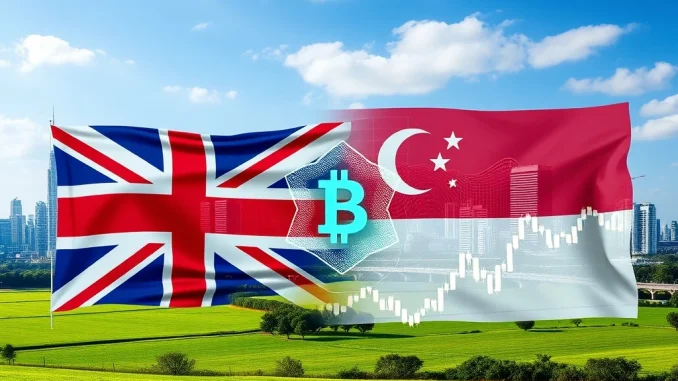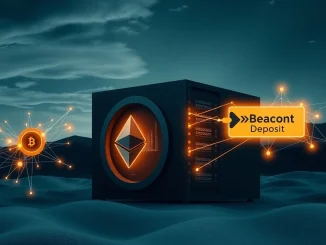
Hey there, crypto and finance enthusiasts! Big news from the world of digital assets, specifically focusing on something called real-world asset tokenization. This week, two major global financial hubs, the UK and Singapore, decided to team up even more closely on this exciting frontier. Why does this matter? Because it could fundamentally change how we own, trade, and interact with everything from property to art to company shares using blockchain technology.
UK Singapore Collaboration: Deepening Ties in Digital Finance
Officials from the United Kingdom and Singapore recently met in London for their 10th Financial Dialogue. This wasn’t just a routine chat; it was a clear signal that both nations are serious about leading the charge in the evolving landscape of digital finance. The key takeaway? They’ve agreed to significantly ramp up their cooperation, particularly in cutting-edge areas like tokenized assets and artificial intelligence (AI).
Think of this as two major players on the global stage pooling their expertise and resources. Both the UK and Singapore are renowned for their robust financial sectors and their forward-thinking approach to technology. By working together, they aim to create a more fertile ground for innovation, attract investment, and potentially set global standards for digital assets.
Project Guardian: Exploring Real-World Asset Tokenization
A major focus of their strengthened partnership is Project Guardian. If you haven’t heard of it, Project Guardian is a joint initiative that brings together financial regulators and key players from the investment industry. Its core mission is to explore the practical, real-world potential of tokenizing financial assets. This means taking traditional assets – like real estate, stocks, bonds, or even commodities – and representing their ownership or value as digital tokens on a blockchain.
The UK and Singapore are committed to expanding this project. They plan to get more industry bodies involved, including prominent organizations like the UK Investment Association and the Investment Management Association of Singapore. This broader participation is crucial because it brings in the practical knowledge and needs of the businesses that will actually use this technology. It’s about moving beyond theoretical discussions and building tangible use cases.
What kinds of things is Project Guardian looking at? It includes exploring how tokenization could improve:
- Liquidity for traditionally illiquid assets
- Efficiency in trading and settlement
- Transparency of ownership records
- Access to investment opportunities for a wider range of investors
Global Layer One (GL1): Facilitating Cross-Border Tokenized Assets
Another significant item on the dialogue agenda was the Global Layer One (GL1) project. While Project Guardian focuses on exploring the *potential* of tokenization, GL1 is about building the *infrastructure* to make cross-border trading of tokenized assets a reality. Trading tokenized assets across different countries and regulatory environments presents unique challenges.
The GL1 project aims to tackle these hurdles head-on. This involves addressing complex issues such as:
- Regulatory Harmony: How do you ensure compliance with different national laws and regulations simultaneously?
- Technical Interoperability: How can different blockchain networks or tokenization platforms communicate and interact seamlessly?
- Legal Frameworks: How are tokenized assets legally recognized and protected across borders?
- Settlement Mechanisms: How can cross-border transactions involving tokenized assets be settled efficiently and securely?
By focusing on these foundational ‘layer one’ issues, the UK and Singapore hope to lay the groundwork for a more connected and efficient global market for tokenized assets. This is vital for scaling tokenization beyond individual projects and enabling truly global trading.
What Does This UK Singapore Collaboration Mean for Digital Finance?
This reinforced partnership between the UK and Singapore is a significant development for the future of digital finance. It signals that major financial powers see tokenization not just as a niche blockchain application, but as a core component of the next generation of financial markets. Their collaborative approach, involving both regulators and industry, is a powerful model for driving innovation responsibly.
For businesses, this could eventually mean new ways to raise capital, manage assets, and access global markets. For investors, it might unlock access to previously illiquid asset classes and potentially offer more efficient trading experiences. For regulators, it’s an opportunity to proactively shape the future of finance, ensuring stability and consumer protection in a rapidly changing technological landscape.
The focus on real-world asset tokenization within initiatives like Project Guardian and the foundational work on GL1 highlight a clear path forward. While challenges remain, the commitment from these two leading nations provides a strong impetus for progress in making tokenized assets a mainstream part of the global financial system.
In Summary: A Unified Push Towards a Tokenized Future
The 10th UK-Singapore Financial Dialogue marks a pivotal moment in the journey towards widespread adoption of digital assets. By agreeing to deepen their collaboration on tokenization and AI, the UK and Singapore are not just exploring new technologies; they are actively working to build the infrastructure and regulatory clarity needed for a tokenized future. Projects like Guardian and GL1 are at the forefront of this effort, demonstrating a practical, industry-involved approach. This partnership is set to accelerate the development of digital finance, promising a future where real-world asset tokenization plays a central, transformative role in global markets.
Keep an eye on how this collaboration unfolds – it could shape the digital asset landscape for years to come!



